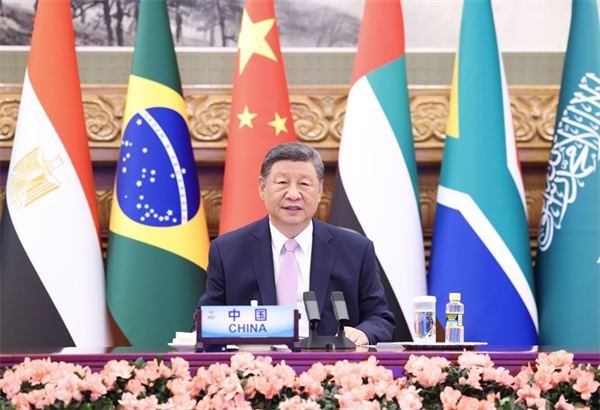BRICS Virtual Summit and China’s Global Governance Initiatives

The BRICS Virtual Summit of 2025, chaired by Brazilian President Luiz Inacio Lula da Silva and attended by leaders from Russia, China, South Africa, Egypt, Iran, Indonesia, the United Arab Emirates, India, and Ethiopia, was held in a turbulent period of international politics. Global trade has been destabilized by tariff wars, unilateral sanctions, and increasing protectionist measures by advanced economies. Against this backdrop, Chinese President Xi Jinping advanced his Global Governance Initiatives through three central proposals, upholding multilateralism to defend fairness and justice, safeguarding openness through win-win cooperation, and deepening solidarity to foster common development. These proposals were framed not simply as diplomatic aspirations but as part of a broader strategy to reshape the foundations of the international system. The first proposal emphasized multilateralism as a safeguard for fairness. Xi described it as the shared aspiration of people everywhere and as a vital underpinning of peace and development. In an era where tariffs and unilateral restrictions are being used as weapons of coercion, this call to multilateralism functions simultaneously as a shield and an instrument of legitimacy. For states that have historically been marginalized in decision-making, multilateralism offers both recognition and a collective mechanism to resist economic domination. BRICS countries represent almost half of the world’s population and one third of global output, and their insistence on reforming institutions such as the IMF and World Bank reflects the recognition that the old multilateral framework is increasingly disconnected from contemporary realities. The demand for multilateralism at this summit was therefore not about preserving the status quo but about transforming institutions so that they mirror the changing distribution of production and power.
The second proposal stressed openness and win-win cooperation in contrast to the rise of protectionism. Xi highlighted that economic globalization is an irresistible historical trend and argued that retreating into isolation is unsustainable. For the BRICS economies, openness is more than a principle; it is a material necessity. Their industrial strategies, export-led growth models, and large-scale infrastructure projects are interconnected with the global system of trade and finance. Yet, tariffs and restrictions imposed by advanced economies threaten their growth paths by disrupting supply chains and closing off markets. By advancing the idea of win-win cooperation, BRICS leaders are attempting to rewrite the logic of globalization. Instead of a system where liberalization primarily benefits capital from developed countries, the new discourse emphasizes inclusivity, reciprocity, and development-centered integration. The establishment of the BRICS New Development Bank, proposals for independent payment systems, and the call for South-South cooperation are examples of mechanisms intended to preserve openness on new terms. Egypt’s proposal for collaboration in renewable energy, agriculture, infrastructure, and artificial intelligence shows how the principle of openness is linked to concrete cooperative projects that can generate autonomy in critical sectors. By reframing globalization in this way, the proposals challenge the legitimacy of tariff wars and protectionist policies, portraying them as obstacles to universal progress.
The third proposal highlighted solidarity and cooperation as the foundation of resilience. Xi argued that the more closely BRICS countries work together, the more effective they will be in addressing external risks. Solidarity here is more than diplomatic goodwill; it is a strategy to transform vulnerability into strength.
For developing nations that are often subject to economic coercion, solidarity provides the means to pool resources, coordinate responses, and amplify collective bargaining power. At the summit, leaders condemned unilateralist bullying and the use of trade as a tool for interference in domestic affairs. They argued that joint action is necessary not only to resist external pressures but also to shape a development agenda that prioritizes the Global South. South Africa’s emphasis on diversifying economic ties across Africa, Asia, and the Gulf demonstrates how solidarity can be operationalized through new trade geographies and investment flows. Solidarity also carries symbolic weight, projecting the image of a multipolar system in which nations cooperate as equals rather than submit to domination.
Taken together, these three proposals form the core of China’s Global Governance Initiatives. They are not abstract concepts but elements of a larger project to build alternative institutions, norms, and practices. Initiatives such as the Belt and Road, the Global Development Initiative, and South-South joint ventures embed these principles in material projects ranging from infrastructure to digital connectivity. In doing so, they create parallel channels of influence and cooperation that reduce dependency on traditional Western-led institutions. This is both a defensive and proactive strategy. Defensively, it seeks to shield BRICS economies from the coercive impact of tariffs, sanctions, and financial monopolies. Proactively, it lays the foundations for a restructured global order where developing countries exercise greater autonomy.
The Global Governance Initiatives also represent an ideological struggle for legitimacy. Western economies have long justified their dominance through the language of free trade and liberal multilateralism, but tariff wars and unilateral sanctions expose the contradictions between rhetoric and practice. By casting themselves as defenders of fairness, openness, and solidarity, BRICS leaders attempt to claim the moral high ground. This narrative seeks to win the consent of other developing countries, positioning BRICS as the authentic representatives of global justice and inclusivity. The claim is that a world order built on these principles would be more equitable and more stable than one dominated by unilateral coercion.
The proposals face contradictions and limitations. Internally, many BRICS states remain deeply unequal, and their ruling elites are often integrated into global capitalist networks. Openness and cooperation may disproportionately benefit large corporations and state-backed projects rather than marginalized communities. Solidarity at the international level does not necessarily translate into solidarity at the social level, where inequalities of class, gender, and region persist. Moreover, differences among BRICS members from geopolitical rivalries to economic asymmetries pose challenges for deeper integration. Independent payment systems and institutional reforms, while visionary, will confront obstacles posed by entrenched global financial structures and the centrality of the dollar.
Despite these challenges, the 2025 summit demonstrated the growing confidence and assertiveness of the Global South in shaping international governance. The leaders not only discussed trade and finance but also addressed conflicts in Ukraine and Gaza, highlighting their willingness to engage with the broader security agenda. By presenting themselves as responsible actors committed to peace and stability, BRICS countries reinforced the image of being a stabilizing force in contrast to unilateral interventionist approaches.
The significance of Xi Jinping’s three proposals lies in their dual character. They respond directly to the crises of the present, tariffs, protectionism, unilateral coercion while also articulating a vision of an alternative future. Multilateralism seeks to transform institutions to reflect real economic power. Openness and win-win cooperation aim to protect and reframe globalization on inclusive terms. Solidarity offers the means to convert vulnerability into collective strength. Together, they represent a blueprint for restructuring global governance in a multipolar age. Whether these initiatives can fully deliver on their promise will depend on the ability of BRICS to translate rhetoric into durable institutions and to manage internal contradictions. Yet the summit made clear that the era when rules could be written unilaterally by a few advanced economies is waning. The Global Governance Initiatives advanced by Xi and embraced by BRICS partners reflect a historic moment in which the Global South is no longer content to be governed by structures designed elsewhere. Instead, it seeks to actively participate in designing a world order that embodies fairness, openness, and solidarity.


